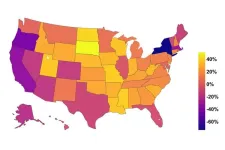(Press-News.org) A person’s immune response to variants of SARS-CoV-2, the virus that causes COVID-19, depends on their previous exposure – and differences in the focus of immune responses will help scientists understand how to optimise vaccines in the future to provide broad protection.
A new study has found that people differ in how vulnerable they are to different mutations in emerging variants of SARS-CoV-2.
This is because the variant of SARS-CoV-2 a person was first exposed to determines how well their immune system responds to different parts of the virus, and how protected they are against other variants.
It also means that the same COVID-19 vaccine might work differently for different people, depending on which variants of SARS-CoV-2 they have previously been exposed to and where their immune response has focused.
The discovery underlies the importance of continuing surveillance programmes to detect the emergence of new variants, and to understand differences in immunity to SARS-CoV-2 across the population.
It will also be important for future vaccination strategies, which must consider both the virus variant a vaccine contains and how immune responses of the population may differ in their response to it.
“It was a surprise how much of a difference we saw in the focus of immune responses of different people to SARS-CoV-2. Their immune responses appear to target different specific regions of the virus, depending on which variant their body had encountered first,” said Dr Samuel Wilks at the University of Cambridge’s Centre for Pathogen Evolution in the Department of Zoology, first author of the report.
He added: “Our results mean that if the virus mutates in a specific region, some people’s immune system will not recognize the virus as well - so it could make them ill, while others may still have good protection against it.”
The research, published today in the journal Science, involved a large-scale collaboration across ten research institutes including the University of Cambridge and produced a comprehensive snapshot of early global population immunity to COVID-19.
Researchers collected 207 serum samples - extracted from blood samples - from people who had either been infected naturally with one of the many previously circulating SARS-CoV-2 variants, or who had been vaccinated against SARS-CoV-2 with different numbers of doses of the Moderna vaccine.
They then analysed the immunity these people had developed, and found significant differences between immune responses depending on which variant a person had been infected with first.
“These results give us a deep understanding of how we might optimise the design of COVID-19 booster vaccines in the future,” said Professor Derek Smith, Director of the University of Cambridge’s Centre for Pathogen Evolution in the Department of Zoology, senior author of the report.
He added: “We want to know the key virus variants to use in vaccines to best protect people in the future.”
The research used a technique called ‘antigenic cartography’ to compare the similarity of different variants of the SARS-CoV-2 virus. This measures how well human antibodies, formed in response to infection with one virus, respond to infection with a variant of that virus. It shows whether the virus has changed enough to escape the human immune response and cause disease.
The resulting ‘antigenic map’ shows the relationship between a wide selection of SARS-CoV-2 variants that have previously circulated. Omicron variants are noticeably different from the others – which helps to explain why many people still succumbed to infection with Omicron despite vaccination or previous infection with a different variant.
Immunity to COVID-19 can be acquired by having been infected with SARS-CoV-2 or by vaccination. Vaccines provide immunity without the risk from the disease or its complications. They work by activating the immune system so it will recognise and respond rapidly to exposure to SARS-CoV-2 and prevent it causing illness. But, like other viruses, the SARS-CoV-2 virus keeps mutating to try and escape human immunity.
During the first year of the pandemic, the main SARS-CoV-2 virus in circulation was the B.1 variant. Since then, multiple variants emerged that escaped pre-existing immunity, causing reinfections in people who had already had COVID.
“The study was an opportunity to really see - from the first exposure to SARS-CoV-2 onwards - what the basis of people’s immunity is, and how this differs across the population,” said Wilks.
END
Vulnerability to different COVID-19 mutations depends on previous infections and vaccination, study suggests
2023-10-05
ELSE PRESS RELEASES FROM THIS DATE:
The end of genes: routine test reveals unique divergence in genetic code
2023-10-05
Scientists testing a new method of sequencing single cells have unexpectedly changed our understanding of the rules of genetics.
The genome of a protist has revealed a seemingly unique divergence in the DNA code signalling the end of a gene, suggesting the need for further research to better understand this group of diverse organisms.
Dr Jamie McGowan, a postdoctoral scientist at the Earlham Institute, analysed the genome sequence of a microscopic organism - a protist – isolated from a freshwater pond at Oxford University Parks.
The work was intended to test a DNA ...
Conscience launches to tackle drug discovery and development for diseases sidelined by pharmaceutical science
2023-10-05
TORONTO (5 October 2023) – Conscience, a game-changing non-profit venture focused on enabling drug discoveries for diseases that have received limited attention from the pharmaceutical industry, launched today with pioneering support from the Canadian government.
With CA$105.7 million in funding, including $49 million from the Canadian government and the engagement of industry, academia, government and patient advocacy groups, Conscience seeks to lead global drug discovery and development for emerging, rare or complex ...
Isis presents a special bibliographic issue on the history of pandemics
2023-10-05
In 1913, historian of science George Sarton created what has become the Isis Current Bibliography of the History of Science (IsisCB). For the last 110 years, the journal Isis has included a comprehensive survey of the recent work in the history of science and allied fields, first in each issue and later as a full yearly supplement. Now the basis of a free online search tool called IsisCB Explore, the IsisCB continues to serve as an indispensable reference for scholars and students.
“Bibliographic ...
Plot thickens in hunt for ninth planet
2023-10-05
CLEVELAND—A pair of theoretical physicists are reporting that the same observations inspiring the hunt for a ninth planet might instead be evidence within the solar system of a modified law of gravity originally developed to understand the rotation of galaxies.
Researchers Harsh Mathur, a professor of physics at Case Western Reserve University, and Katherine Brown, an associate professor of physics at Hamilton College, made the assertion after studying the effect the Milky Way galaxy would have on objects in the outer solar system—if the laws of gravity were governed by a theory known as Modified ...
Factors associated with marijuana use among high-risk college students
2023-10-05
The past decade has seen a significant increase in marijuana use among U.S. college students. This increase has coincided with notable changes in national and local cannabis laws and policies, and perceptions of the associated drug’s risk over the same period. However, cannabis use by students continues to be a public health challenge throughout the country. Universities have long relied on education programs to address these risks; however, many of these programs have limitations and fail to consider some of the modern risk factors ...
Precise gene editing in human stem cells and neurons reveals links between genome organization and autism
2023-10-05
NEW YORK, NY (October 5, 2023) – Researchers have used CRISPR gene editing, stem cells and human neurons to study the impact of a gene that is commonly mutated in autism. This new study, published today in The American Journal of Human Genetics, ties mutations in the gene CHD8 with a broad spectrum of molecular and cellular defects in human cortical neurons.
Autism is a highly heritable disorder with a recent increase in incidence — approximately 1 in 40 children in the US are diagnosed with autism. Over the past decade, sequencing studies have found many ...
AI helps reduce online harassment by enhancing conversation courtesy
2023-10-05
Check the comments section of many social media and digital news platforms, and you’re likely to find a cesspool of insults, threats and even harassment. In fact, a Pew Research Center survey found that 41% of American adults have personally experienced online harassment, and one in five adults say they’ve been harassed online for their political views.
But researchers at BYU and Duke University say derisive online conversations don’t have to be the norm. A joint paper between the two universities found that artificial intelligence can be used to improve conversation quality and promote civil dialogue in online ...
Two-day course teaches hospitals and health systems how to address unprofessionalism and unsafe behavior
2023-10-05
With a myriad of external pressures and challenges facing hospitals and health systems today, it is more important now than ever to mitigate internal risks. Unprofessional behavior, which negatively impacts patient care, retention, and team dynamics, is a legal, financial, and cultural risk that many health systems are now looking to address head-on. Peer-reviewed research consistently shows unprofessional behavior in health systems can be reduced by 85% through implementing the right tools and processes.
The Vanderbilt ...
Study highlights use of TikTok to encourage cervical cancer screening
2023-10-05
TikTok and other short-form video platforms are booming in popularity — for entertainment and for sharing information, including health information.
Researchers are currently examining the effects of social media videos, and among them is Ciera Kirkpatrick, assistant professor of advertising and public relations at the University of Nebraska–Lincoln. Kirkpatrick, who studies the intersection of communication and health, recently turned her scientific eye toward TikTok.
In a newly published article, Kirkpatrick and co-author LaRissa Lawrie, a doctoral ...
K-pop fans helped COVID-19 public health messaging go viral
2023-10-05
Three years ago, as part of the public health messaging in response to the COVID-19 pandemic, the World Health Organization launched the "Wear A Mask" campaign on social media.
However, despite their benefits to public health, mask-wearing quickly became a highly politicized and divisive issue across the globe.
But the campaign gained impressive traction after World Health Organization Director-General Tedros Adhanom Ghebreyesus issued the following tweet on X, the social media platform known at the time as Twitter, on August 21, 2020, thanking BTS, a South Korean K-pop group, for supporting the mask-wearing public ...



